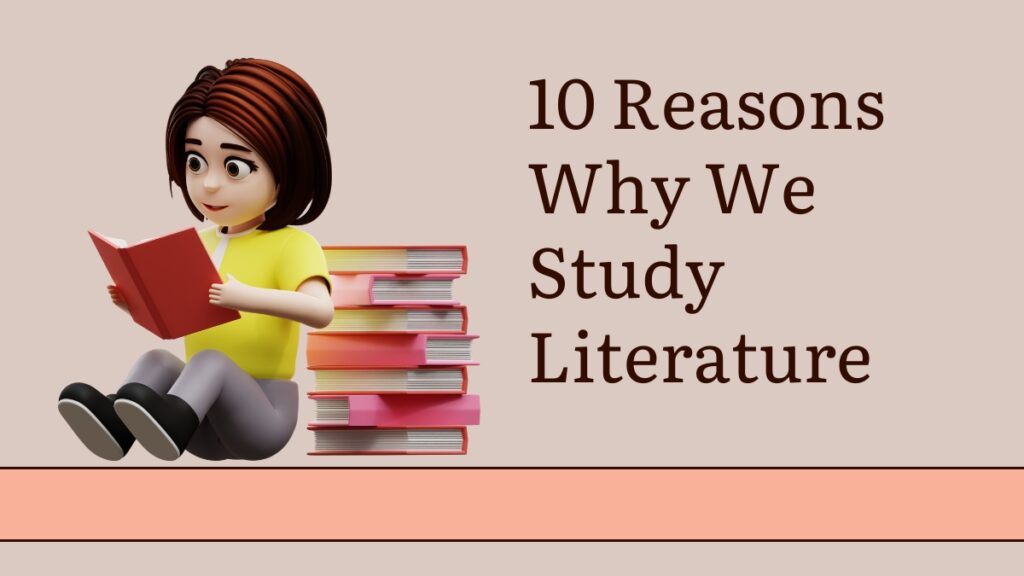Discover 10 reasons why we study literature! Dive into different worlds, cultures, and ideas. See things from new perspectives and expand your thinking.
Exploring literature is akin to embarking on a voyage through diverse realms and perspectives. It transcends mere reading; it involves comprehending individuals, societies, and concepts. Literature offers us the opportunity to view the world through varied lenses, fostering fresh and stimulating modes of thought.
Whether delving into a timeless masterpiece or immersing in contemporary works, here are ten compelling reasons why studying literature is both crucial and enjoyable.
Definition of Literature in English
Literature can be understood in two main ways:
Broadly
Literature includes all written works, like novels, poems, plays, essays, biographies, and even technical documents.
Narrowly
Literature refers to writings considered an art form, such as works with high artistic merit and enduring value.
Additional nuances include oral literature and genre-bending works like exceptional non-fiction.
Ultimately, literature is a powerful tool for preserving knowledge, exploring human experiences, developing skills, and entertaining and inspiring us.
Importance and Relevance of Studying Literature
Check out the importance and relevance of studying literature:-
| Aspect | Benefits of Literature |
|---|---|
| Sharpens Thinking | Improves critical thinking skills. |
| Enhances Communication | Boosts writing and speaking skills. |
| Offers Insights | Provides cultural and historical context. |
| Fuels Creativity | Sparks imagination and new ideas. |
| Promotes Learning | Keeps us curious and engaged. |
| Aids Emotional Intelligence | Helps us understand and manage emotions. |
| Teaches Life Lessons | Explores universal themes and values. |
Types of Literature
Literature can be classified into four main types:
| Genre | Description | Examples |
|---|---|---|
| Fiction | Imaginary stories about characters and events. | Novels, novellas, short stories. |
| Nonfiction | Presents factual information. | Biographies, essays, history books. |
| Poetry | Uses language creatively to evoke emotions and ideas. | Features figures of speech, meter, rhyme. |
| Drama | Intended for stage performance. | Features dialogue, action, conflict. |
These categories provide a simple framework for understanding the different types of literature.
10 Reasons Why We Study Literature
Check out 10 Reasons Why we study literature
Cultural Understanding
Amy Tan’s “The Joy Luck Club” really delves into the lives of Chinese-American families, showing their traditions, struggles, and how they figure out their identity in a new place. It’s not just about cultural differences; it touches on deep stuff like family ties, sacrifices, and chasing dreams.
Empathy Development
Have you read R.J. Palacio’s “Wonder”? It’s all about Auggie Pullman, this kid with facial differences, and his journey through school life and making friends. You really feel for Auggie and learn so much about empathy, kindness, and what it means to be true to yourself. It’s heartwarming and makes you think.
Critical Thinking
George Orwell’s “Animal Farm” is such a clever book. It uses farm animals to poke fun at politics and human behavior. It’s a real eye-opener about power, corruption, and what happens when authority goes unchecked. Makes you question things and look beneath the surface.
Language Skills
Dr. Seuss’s books, like “Green Eggs and Ham,” are not just fun reads—they’re like a playground for language! The rhymes and creative language really get your brain going, whether you’re a kid or an adult. They’re awesome for building vocab and getting you excited about words.
Historical Insight
Anne Frank’s “The Diary of a Young Girl” gives you a firsthand look at what it was like during the Holocaust, from a young Jewish girl’s perspective. Anne’s diary shows the struggles of hiding and the strength people have in tough times. It’s a powerful story that really hits you with the history and the human spirit.
Creativity
Who hasn’t been enchanted by J.K. Rowling’s “Harry Potter” series? Hogwarts, magic creatures, mysteries—Rowling’s world-building is incredible. It’s not just about the adventure; it sparks your imagination and makes you think creatively. Plus, themes of friendship and bravery stick with you.
Emotional Intelligence
E.B. White’s “Charlotte’s Web” is a classic for a reason. The friendship between Wilbur the pig and Charlotte the spider teaches us about empathy, loss, and the power of love. It’s touching and reminds you of the importance of caring connections.
Morality and Ethics
“To Kill a Mockingbird” by Harper Lee is a must-read. Through Scout Finch’s eyes, you see the challenges of racial injustice in the South. It really makes you think about empathy, prejudice, and standing up for what’s right. A powerful story that stays with you.
Universal Themes
Paulo Coelho’s “The Alchemist” takes you on Santiago’s journey to find his destiny. It’s all about fate, perseverance, and following your dreams. It’s a story that resonates with people everywhere, making you think about your own journey and purpose in life.
Personal Growth
Elizabeth Gilbert’s “Eat, Pray, Love” is like going on a journey with her through Italy, India, and Indonesia. Her experiences of healing, spirituality, and new cultures make you reflect on your own path to happiness. It’s about growth, change, and embracing life.
These books aren’t just stories—they’re experiences that teach us about life, empathy, and understanding. They challenge us to think deeper, explore new perspectives, and grow as individuals.
10 reasons why we study literature in the world
Here are 10 simple reasons why studying literature is valuable:
| Aspect | Benefits of Reading Literature |
|---|---|
| Empathy | Experience life from different perspectives. |
| Human Experience | Connect with universal themes like love and loss. |
| Critical Thinking | Analyze and interpret stories. |
| Communication | Improve language skills. |
| Cultural Heritage | Appreciate history and culture. |
| Creativity | Spark imagination and new ideas. |
| Historical Context | Understand different time periods. |
| Social Awareness | Highlight important issues. |
| Lifelong Learning | Foster curiosity and love for learning. |
| Enjoyment | Enjoy and relax with great stories. |
10 reasons why we study literature for students
| Aspect | Benefits of Reading |
|---|---|
| Explore New Worlds | Dive into different places and times through stories. |
| Understand Others | Connect with diverse characters and emotions. |
| Learn Language Skills | Discover new words and writing styles. |
| Improve Critical Thinking | Analyze and write effectively. |
| Find Hidden Meanings | Understand symbolism and messages. |
| Spark Creativity | Tell your own stories and ideas. |
| Discover History | Learn about cultures and past events. |
| Question Norms | Think critically about the world. |
| Strengthen Your Mind | Enhance memory and concentration. |
| Know Yourself | Gain insights into human nature and yourself. |
Enjoy your reading journey!
Why is it important that we study literature?
| Aspect | Benefits of Literature |
|---|---|
| Empathy | Literature exposes us to diverse perspectives, fostering understanding and empathy. |
| Critical Thinking | It challenges us to analyze texts and uncover deeper meanings. |
| Communication | We learn diverse vocabulary and writing styles, improving our ability to express ourselves. |
| Cultural Heritage | Literature preserves history and societal values, enriching our understanding of the past. |
| Creativity | It sparks imagination and inspires new ideas. |
| Lifelong Learning | Literature cultivates curiosity and critical thinking skills for ongoing personal growth. |
Literature helps us connect with others, understand different cultures, and navigate life with insight and creativity.
What are the 5 benefits of literature?
5 Benefits of Literature:-
| Aspect | Benefits of Reading Literature |
|---|---|
| Strengthens Critical Thinking | Analyzing stories improves our thinking skills. |
| Boosts Empathy | Reading helps us understand others’ perspectives. |
| Enhances Communication | Great books improve our vocabulary and writing. |
| Ignites Creativity | Literature sparks our imagination. |
| Provides Lifelong Learning | Reading keeps us curious and informed. |
Why do we do literature study?
Why We Study Literature
Personal Growth
Understanding Human Nature: Literature explores themes like love and loss, helping us understand ourselves.
Building Empathy: It allows us to see life from different perspectives.
Sparking Creativity: Stories ignite our imagination and inspire innovation.
Lifelong Learning: Encourages a love for reading and continuous learning.
Skill Development
Critical Thinking: Analyzing stories improves our thinking skills.
Better Communication: Enhances our vocabulary and writing.
Forming Arguments: Helps us develop and defend our viewpoints.
In short, literature enriches our lives and sharpens our skills.
What are my reasons for studying English Literature?
Consider these questions:
Enjoyment: Do you love reading and language’s beauty?
Human Experience: Are you curious about life’s themes across cultures?
Critical Thinking: Do you like analyzing ideas and forming interpretations?
Communication Skills: Want to improve writing and vocabulary?
Creativity: Does literature inspire your creativity?
Career Goals: Interested in fields needing strong communication?
Lifelong Learning: Value intellectual curiosity and exploration?
English Literature can fulfill these. Reflect on what excites you!
Conclusion
Studying literature is like discovering a treasure trove of perks that make life more interesting. It helps us understand others better, improves our thinking skills, and lets us explore different worlds. It’s like having a special mirror that shows us what it means to be human, sparking our imagination and making us think about important things in society.
Plus, it lets us travel through time and space, learning about different cultures and finding truths that everyone can relate to.
Maroc Jameson is a dedicated educator with a strong commitment to enhancing learning experiences. He specializes in presenting information through concise “10 tips” formats, covering various topics such as “10 reasons to pursue a new skill” and “10 important benefits of reading.”



